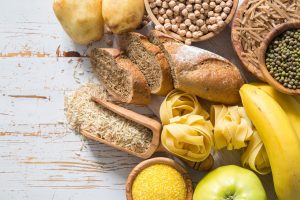
But is this fair?
Not really. Although carbohydrates are sugar, they are not inherently bad. Not all sugar is bad, believe it or not. In fact, your body needs it to run. Glucose (stored sugar) is your body’s preferred source of energy. Sugar allows your muscles and organs to do work.
Like other things, carbohydrates can be a force for both good and evil. It usually comes down to dose and source. If you’re eating too many carbohydrates and getting them from the wrong places, they can cause devastating effects like weight gain, heart troubles, type-2 diabetes, liver disease, and more.
So, how do you distinguish between good and bad?
It’s quite easy.
If it comes naturally in a food – like a fruit, vegetable, grain, or dairy – it’s a high-quality carbohydrate. It can be dangerous if the sugar has been added to something, like a snack or beverage, or another type of processed food like white bread.
Fruit, vegetables, dairy, and grains all feature natural sugars. But the sugar is in low doses and comes along with a host of other nutrients. Fruits, vegetables, and most grains contain fiber, as well, which helps with sugar absorption. This means blood sugar levels are highly unlikely to spike.
Dairy can be tricky. Dairy contains lactose, a naturally-occurring sugar, in generally low amounts. But flavored yogurts have sugar added, making them more like junk food than a healthy snack. So, when it comes to yogurt, go plain and add fruit for some sweetness and high-quality carbohydrates.
Fruit juices can be confusing, too. They are made from fruit, but they have very high sugar concentrations without fiber to act as a buffer. Instead of drinking your fruit or making smoothies, eat it and wash it down with a glass of water.
Take a look at the ingredients of packaged food. When you see terms ending in “ose,” including high-fructose corn syrup, you can almost guarantee it’s a bad carbohydrate.
On the other hand, it’s a good carbohydrate when food comes from the produce section and is unpackaged. Further, if it is a brown grain, it’s likely a good carbohydrate.
Use good carbs to make up roughly half your daily caloric intake, and there’s a great chance you’ll have a low risk of illness and a highly functional body.